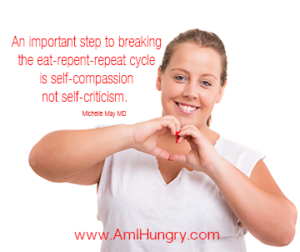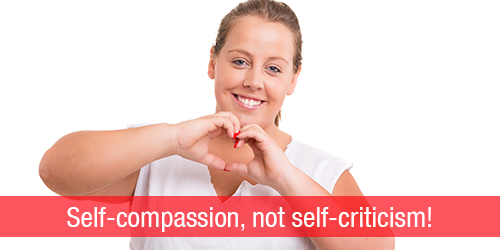While it’s probably not your first impulse, self compassion when you eat for emotional reasons will help you work through emotional eating more quickly and effectively. How does a compassionate response to emotional eating help?
Forgiving yourself for overeating helps you take the next step to find ways to meet your emotional needs more effectively.
Emotional eating works… temporarily
Everyone eats for emotional reasons! It’s part of “normal” eating.
 We eat to celebrate, connect, and relax. We may also eat when we’re experiencing uncomfortable emotions. When you eat for emotional reasons—when you’re sad, mad, glad, stressed, or lonely—you may be eating in order to feel better, because eating works!
We eat to celebrate, connect, and relax. We may also eat when we’re experiencing uncomfortable emotions. When you eat for emotional reasons—when you’re sad, mad, glad, stressed, or lonely—you may be eating in order to feel better, because eating works!
Temporarily.
Unfortunately, sometimes you may feel worse afterward—emotionally and physically. Whatever situation or emotion triggered you to want to eat doesn’t just go away and you may feel physically full and uncomfortable too.
That may cause you to beat yourself up—quite literally adding insult to injury. The guilt and shame become yet another trigger for emotional eating, feeding the eat-repent-repeat cycle.
What if the first step to breaking this cycle of emotional eating is self-compassion instead of self-criticism? How might that help? And more important, where do you start?
How does self-compassion help with emotional eating?
As difficult as it may be to fathom, being understanding and forgiving of yourself for overeating will help you take the next step to finding other ways to meet your emotional needs.
After all, you don’t eat for emotional reasons because you are “weak-willed,” “stupid,” or “out of control.”
You do it because it works!
Blaming, shaming, criticizing, and finding fault for attempting to care for yourself only backfires. Imagine you were teaching a young child something new… would blaming, shaming, criticizing, and finding fault help or hurt? The way you speak to yourself has just as much power!
(You may be afraid that if you are “nice” to yourself, you won’t change, but the opposite is true! You care for yourself because you accept yourself, not so you’ll accept yourself. Read this article, Fear of Self-Acceptance.)
So how can you begin to respond with self-compassion when you overeat?
Three Ways to Nurture Self-Compassion
1) Gently acknowledge you were doing the best you could in that moment.
Validate your thoughts, feelings, and actions as being normal and understandable given the circumstances. As Dr. Kari Anderson, my co-author of Eat What You Love, Love What You Eat for Binge Eating, says, “Of course!” It’s like saying, “I totally get why you thought, felt, or did that!”
Of course you ate! Who wouldn’t want to feel better when you’re sad, mad, stressed, or lonely—or magnify the pleasure when you’re glad? This validation and unconditional acceptance creates a safe environment for experimenting with new thoughts, feelings, and actions.
When you overeat, validate the choice as being rational at the time: “Of course you __________________!” This gentle, understanding self-talk will open the door to exploring how you might do it differently next time if you don’t like how it turned out.
2) Bring nonjudgmental awareness to the situation.
Mindful eating is all about bringing nonjudgmental awareness to your choices and experiences with eating. Nonjudgment is essential because it provides a more objective understanding of what happened and why.
During our Mindful Eating for Emotional Eating and Binge Eating Programs, we work on identifying the “voices” that show up during an emotional eating or binge eating episode. Nonjudgmentally recognizing how your Restrictive Eating, Overeating, and Binge Eating voices drive the cycle affords you the opportunity to cultivate your Self-Care Voice. (Read through this sample script to see how this works.)
3) Cultivate Your Self-Care Voice
Your Self-Care Voice wants the best for you. It is unconditionally compassionate, affirming, and accepting.
Your Self-Care voice is the voice of kindness and wisdom. It is like a loving parent who guides you to learn from your mistakes, face your challenges, and loves you unconditionally, faults and all.
Bring in your self-care voice when you feel uncomfortable after eating for emotional reasons. Your self-care voice might sound something like this:
It’s uncomfortable to feel stressed and overwhelmed, so of course you wanted to feel better. Choosing food helped for a little bit. Now, let’s think about what you needed and what else would feel better… Stepping away from your computer for a little while? Making a list and prioritizing what needs to be done? Taking a break? Taking a few deep breaths? Maybe asking for some help? Let’s pick one or two small steps and try those.
A Compassionate Response to Emotional Eating
When you eat for emotional reasons, guilt and shame only add fuel to the fire!
Self-compassion is a gentle way to calm yourself so you can step back and consider what needs your emotions were trying to tell you about how to meet your true needs.
Enjoyed this article? Here are three more to help you:
How to Decode Emotional Eating
Caught in an Endless Cycle of Emotional Eating and Dieting


